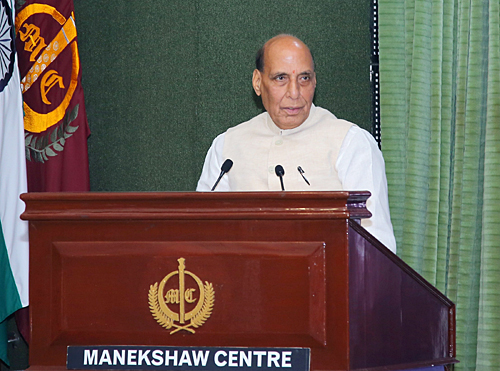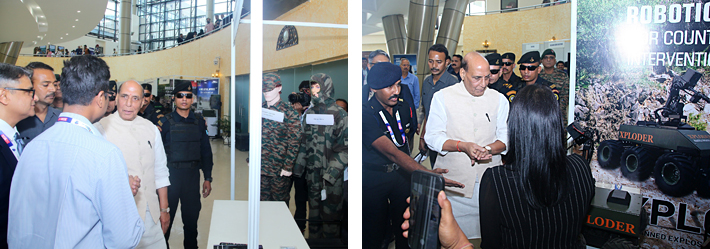INDIAN ARMED FORCES CHIEFS ON OUR RELENTLESS AND FOCUSED PUBLISHING EFFORTS

The insightful articles, inspiring narrations and analytical perspectives presented by the Editorial Team, establish an alluring connect with the reader. My compliments and best wishes to SP Guide Publications.

"Over the past 60 years, the growth of SP Guide Publications has mirrored the rising stature of Indian Navy. Its well-researched and informative magazines on Defence and Aerospace sector have served to shape an educated opinion of our military personnel, policy makers and the public alike. I wish SP's Publication team continued success, fair winds and following seas in all future endeavour!"

Since, its inception in 1964, SP Guide Publications has consistently demonstrated commitment to high-quality journalism in the aerospace and defence sectors, earning a well-deserved reputation as Asia's largest media house in this domain. I wish SP Guide Publications continued success in its pursuit of excellence.
- Prime Minister Modi Visits Punjab’s Adampur Air Base, Interacts with Airmen after Successful ‘Operation Sindoor’; Stern Message to Pakistan
- The layered Air Defence systems that worked superbly, the key element of Operation Sindoor
- Operation Sindoor | Day 2 DGMOs Briefing
- Operation Sindoor: India strikes back with Precision and Purpose
- Operation Sindoor: Resolute yet Restrained
- India’s Operation Sindoor Sends a Clear Message to Terror and the World – ‘ZERO TOLERANCE’
- Japan and India set forth a defence cooperation consultancy framework, talks on tank and jet engines
- Terrorist Attack in Pahalgam in Kashmir: Unfolding a long surgical war against PAK
- Lt General Pratik Sharma takes over Command of Indian Army's Northern Command
India to emerge as a developed nation and number one military power in the world: Defence Minister
"India's defence sector is moving ahead on the path of self-reliance, it is also ready to play a very important role in making global supply chains resilient"
Our Defence capabilities are like a credible deterrence, to maintain peace & tranquillity. Peace is possible only when we remain strong: Defence Minister

Defence Minister Rajnath Singh laid out a compelling vision for a self-reliant and future-ready India at a Defence Conclave in New Delhi today on April 17, 2025. With a clear focus on indigenisation, innovation, and global leadership, he declared that India is not only securing its borders but also positioning itself as a key player in the international defence ecosystem. "The day is not far when India will not only emerge as a developed country, but our Military Power will also emerge as the number one in the world," he added.
Defence Minister reiterated that under the leadership of Prime Minister Narendra Modi, the revival and strengthening of the defence sector is one of the biggest priorities for the government. He further stated that the government's first and foremost challenge was to change the mindset that India would simply import to meet its defence needs. "India will reduce its dependency on imports and create a defence industrial complex that will not only meet India's needs but will also strengthen the potential of defence exports," he emphasised.
"Today, while India's defence sector is moving ahead on the path of self-reliance, it is also ready to play a very important role in making global supply chains resilient," Defence Minister emphasised. He added that the Make in India program is not only strengthening the country's defence production but also has the capability to make the global defence supply chain resilient and flexible. He further stated that while India's defence manufacturing capabilities are aimed at national security and strategic autonomy, they are also insulating manufacturing from global supply shocks.
Rajnath Singh underlined that India's growing defence capability is not meant to provoke conflict. "Our defence capabilities are like a credible deterrence, to maintain peace and tranquillity. Peace is possible only when we remain strong," he added.

On the evolving nature of warfare, Rajnath Singh underscored that in the coming days, conflicts & wars will be more violent and unpredictable. The Cyber & Space Domains are rapidly emerging as new battlefields and along with this, a war of narrative & perception is also being fought all over the world. To address these challenges, he mentioned that the focus is on holistic capacity building and continuous reforms. Defence Minister also announced that the Ministry of Defence had declared 2025 as the 'Year of Reforms'.
Reflecting on reforms, Rajnath Singh highlighted that corporatising the over 200-year-old Ordnance Factories was a bold but necessary step. "Today Ordnance Factories are performing very well in their new form and have become profit making units. I believe that changing a structure that is more than two hundred years old is a very big reform of this century" he added.
Defence Minister also outlined the government's indigenisation drive, noting the release of five positive indigenisation lists by the Armed Forces and five by Defence Public Sector Undertakings (DPSUs). "The total number of defence equipment, weapon systems and platforms included in the list of the Services is 509. These will now be produced in India. Similarly, the total number of items included in the DPSU lists is 5,012 including strategically-important Line Replacement Units, sub-systems, spares and components," he said.
Rajnath Singh also underlined the fact that the government has reserved 75 per cent of the defence budget for procurement from domestic companies. He pointed out that defence production in India has risen from ₹40,000 crore in 2014 to over ₹1.27 lakh crore today. "This year, defence production should cross ₹1.60 lakh crore, while our target is to produce defence equipment worth ₹3 lakh crore by the year 2029," he added.
On defence exports, Defence Minister underscored that the figures had surged from ₹686 crore in 2013–14 to ₹23,622 crore in 2024–25. "Defence products made in our country are being exported to about 100 countries. "our defence exports should reach ₹30,000 crore this year and ₹50,000 crore by the year 2029," he announced.
Rajnath Singh underlined the government's commitment to fostering innovation, particularly among the youth and start-ups. He stated that to encourage cutting-edge technology in the defence sector, iDEX was launched, which offers financial support of up to ₹1.5 crore to selected start-ups. Building on its success, iDEX Prime was introduced, enhancing this support to ₹10 crore. Further, the newly launched ADITI scheme provides assistance of up to ₹25 crore to help scale breakthrough innovations. "The target is to strengthen the hands of our start-ups and MSMEs and for this, the Ministry of Defence has approved purchases worth more than ₹2,400 crore from start-ups/MSMEs, and projects worth more than ₹1,500 crore have been approved for development of new technology," he added.
Highlighting India's growing strategic capabilities, Defence Minister mentioned that the country now stands shoulder to shoulder with developed nations in critical areas such as missile technology (Agni, BrahMos), submarines (INS Arihant), aircraft carriers (INS Vikrant), artificial intelligence, drones, cyber defence and hypersonic systems. "Aero engine manufacturing remains a challenge," he said, while also pointing to significant progress under the Kaveri engine project and ongoing discussions with global players like Safran, GE and Rolls Royce to build domestic capabilities.
With emphasis on India's success in shipbuilding, Rajnath Singh stated that more than 97% of the war ships of Indian Navy and Indian Coast Guard are now built in Indian shipyards. Ships built by India are also being exported to friendly countries like Mauritius, Sri Lanka, Vietnam and Maldives.
Senior officials, experts and dignitaries including former Chief of Army Staff General Manoj Pande, former Chief of Naval Staff Admiral Sunil Lanba, former Chief of the Air Staff Air Chief Marshal V.R. Chaudhari, Secretary (Defence Production) Sanjeev Kumar, Secretary, Department of Defence R&D and Chairman DRDO Dr Samir V. Kamat and former Defence Secretary Sanjay Mitra also attended the conclave.





